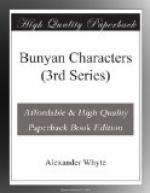(3) There is a third lesson here, but it is a lesson for ministers, and I shall take it home to myself.
CHAPTER XXIV—A FAST-DAY IN MANSOUL
’Sanctify a fast, call a solemn
assembly, gather the elders and all
the inhabitants of the land into
the house of the Lord your
God.’—Joel.
In our soft and self-indulgent day the very word ‘to fast’ has become an out-of-date and an obsolete word. We never have occasion to employ that word in the living language of the present day. The men of the next generation will need to have it explained to them what the Fast-days of their fathers were: when they were instituted, how they were observed, and why they were abrogated and given up. If your son should ever ask you just what the Fast-days of your youth were like, you will do him a great service, and he may live to recover them, if you will answer him in this way. Show him how to take his Cruden and how to make a picture to his opening mind of the Fast-days of Scripture. And tell him plainly for what things in fathers and in sons those fasts were ordained of God. And then for the Fast-days of the Puritan period let him read aloud to you this powerful passage in the Holy War. Public preaching and public prayer entered largely into the fasting of the Prophetical and the Puritan periods; and John Bunyan, after Joel, has told us some things about the Fast-day preaching of his day that it will be well for us, both preachers and people, to begin with, and to lay well to heart.
1. In the first place, the preaching of that Fast-day was ‘pertinent’ and to the point. William Law, that divine writer for ministers, warns ministers against going off upon Euroclydon and the shipwrecks of Paul when Christ’s sheep are looking up to them for their proper food. What, he asks, is the nature, the direction, and the strength of that Mediterranean wind to him who has come up to church under the plague of his own heart and under the heavy hand of God? You may be sure that Boanerges did not lecture that Fast-day forenoon in Mansoul on Acts xxvii. 14. We would know that, even if we were not told what his text that forenoon was. His text that never-to-be-forgotten Fast-day forenoon was in Luke xiii. 7—’Cut it down; why cumbereth it the ground?’ And a very smart sermon he made upon the place. First, he showed what was the occasion of the words, namely, because the fig-tree was barren. Then he showed what was contained in the sentence, to wit, repentance or utter desolation. He then showed also by whose authority this sentence was pronounced. And, lastly, he showed the reasons of the point, and then concluded his sermon. But he was very pertinent in the application, insomuch that he made all the elders and all their people in Mansoul to tremble. Sidney Smith says that whatever else a sermon may be or may not be, it must be interesting if it is




